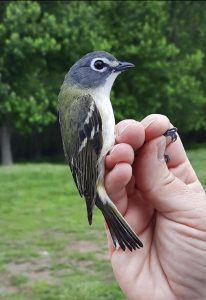
Blue-headed Vireo
Below are the highlights of the spring 2024 banding season at the LLCC Bird Banding Station. This was our 23rd banding season (11th spring season) since the station’s inception (fall 2012).
- We banded 877 birds of 66 species over 31.5 banding days. This translates into 28.2 birds banded per day.
- We also had 197 repeat captures (birds banded earlier during the spring 2024 season) and 67 return captures (birds banded during a previous season).
- Two of the more interesting recaptures were a House Sparrow that was originally banded in fall 2016 and a Northern Cardinal and Red-winged Blackbird, which were both originally banded in 2017.
- Our highest one-day total was 87 birds banded on March 18.
- The top five species banded (by abundance) for the season were as follows – species (# banded): Dark-eyed (Slate-colored) Junco (282), Swamp Sparrow (64), Gray Catbird (55), Swainson’s Thrush (54) and White-throated Sparrow (46).
- The cumulative total number of birds banded (over 23 seasons) at the LLCC BBS is 36,927 birds of 135 species.
- We continue to host many volunteers and guests, including a number of LLCC biology classes, UIS graduate students and employees from the Illinois Department of Natural Resources and Illinois Natural History Survey.
- Our fall banding operations are scheduled to begin Aug. 14, 2024.
All banding, marking and sampling is being conducted under a federal Bird Banding Permit issued by the U.S. Geological Survey’s BBL.
If you are interested in following our daily/weekly banding activities, we have two Facebook pages you are welcome to follow: Lincoln Land Community College Bird Banding Station (daily reports/photos of our banding activities at LLCC) and Lincoln Land Association of Bird Banders – LLABB (~ weekly reports/photos of banding activities at other sites throughout central Illinois).
You are most welcome to stop by the banding station whenever your schedule allows! (Hours of operation: 7~11:30 a.m. on Monday, Wednesday, Thursday and Saturday during the fall and spring migration seasons.)
Tony Rothering, professor of biology
